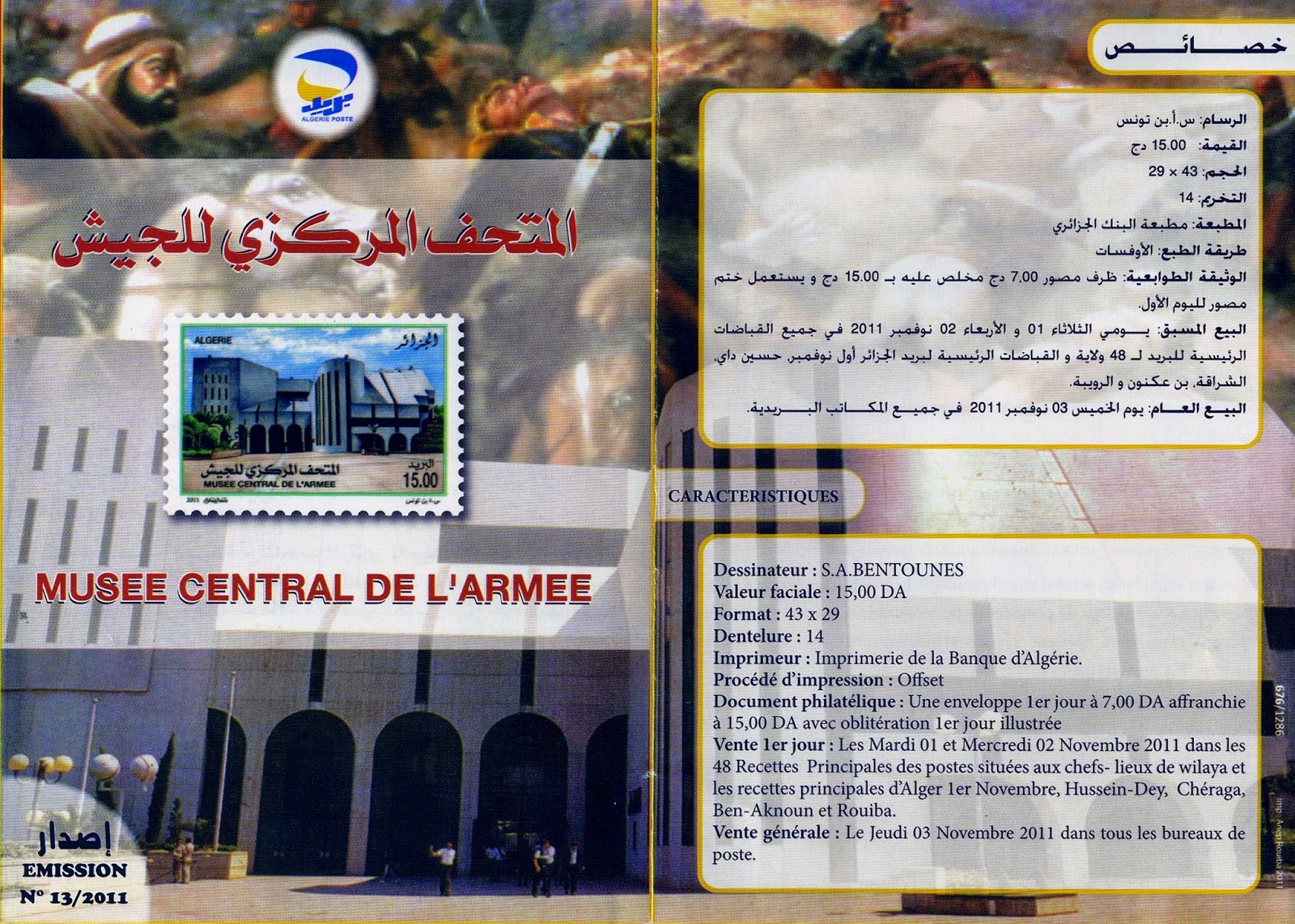Many thanks to Karim Benmohamed for
his nice cover from Algeria and the first day cover he sent me.
Karim is philatelist and the owner of the blog : http://algeriastamps.blogspot.gr/
About the five stamps cover :
1. FIRST STAMP
2. SECOND STAMP
Koléa
3. THIRD STAMP
1. FIRST STAMP
GAZELLA DEMA
from
ANIMALS (FAUNA)
commemorative stamp set / issued 13.3.1992
The dama gazelle, addra gazelle, or mhorr gazelle (Nanger dama, formerly
Gazella dama) is a species of gazelle. It lives in Africa in the Sahara desert
and the Sahel. This critically endangered species has disappeared from most of
its former range due to overhunting and habitat loss, and natural populations
only remain in Chad, Mali, and Niger. Its habitat includes grassland,
shrubland, semi-deserts, open savanna and mountain plateaus. Their diets
includes grasses, leaves (especially Acacia leaves), shoots, and fruit.
more info at : http://en.wikipedia.org/wiki/Dama_gazelle
2. SECOND STAMP
Koléa
from
Vtews of Algeria before 1830
Definitive stamp set / issued 18.7.1984
Location of Koléa in Algeria
Coordinates:
36°38′26″N 2°45′54″E Coordinates:
36°38′26″N 2°45′54″E
Country :Algeria - Province : Tipaza - District : Koléa
Population 40.000
Kolea is a town in Tipaza Province, northern Algeria,
located approximately 20 miles (32 km) southwest of Algiers. It lies on the southern,
inland slopes of the coastal hills overlooking the valley of Wadi Mazafran and
the Mitidja plain and has a current population of approximately 40,000.
Kolea was founded in the 1550 by Barbarossa, Admiral
of the Ottoman Navy and Pasha of Algiers, and originally settled by Andalusian
Moors. Its name in Arabic means "little fort".
French Presence
Kolea was held by Abdelkader's forces against the
French from 1832 until the former were subdued in 1843. Destroyed by an
earthquake in 1825, the town was rebuilt along French lines. The 17th-century
mosque of Sidi Embarek was converted into a hospital, but the adjoining qubbah,
or shrine, has remained an important place of Muslim pilgrimage. The town is
noted for handmade embroidery and lace.
In 1838, Lamoricère moved there with his regiment of
Zouaves and built four forts: at Fouka, Tombourouf, Ben Azzouz, and
Mokta-Khera.
More info at : http://en.wikipedia.org/wiki/Kol%C3%A9a
3. THIRD STAMP
ARMY CENTRAL MUSEUM
(MUSEE CENTRAL DE L' ARMEE)
from
Algerian Museum
commemorative stamp set / issued 1.11.2011
The Central Army Museum, located in Riadh El Feth complex, opposite to
the Martyr's Sanctuary contains exhibitions on the history of Algeria
resistance through various ages: prehistoric and ancient, medieval,
modern and contemporary.
4. FOURTH STAMP
Events of 17.10.1961
50th Anniversary of the Events of 17.10.1961
commemorative stamp set / issued 17.10.2011
Paris massacre of 1961
From Wikipedia, the
free encyclopedia
Tagged on the Saint-Michel Bridge in 1961: "Ici
on noie les Algériens" ("Here we drown Algerians"). Dozens of
bodies were later pulled from the River Seine.
The Paris massacre of 1961 was a massacre in Paris on
17 October 1961, during the Algerian War (1954–62). Under orders from the head
of the Parisian police, Maurice Papon, the French police attacked a forbidden
demonstration of some 30,000 pro-FLN Algerians. Two months before, FLN had
decided to increase the bombing in France and to resume the campaign against
the pro-France Algerians and the rival Algerian nationalist organization called
MNA in France. After 37 years of denial, in 1998 the French government
acknowledged 40 deaths, although there are estimates of over 200.
The 17 October 1961 massacre appears to have been
intentional, as has been demonstrated by historian Jean-Luc Einaudi, who won a
trial against Maurice Papon in 1999 — the latter was convicted in 1998 on
charges of crimes against humanity for his role under the Vichy
collaborationist regime during World War II. Official documentation and
eyewitnesses within the Paris police department indeed suggest that the
massacre was directed by Maurice Papon. Police records show that Papon called
for officers in one station to be 'subversive' in quelling the demonstrations,
and assured them protection from prosecution if they participated. Many
demonstrators died when they were violently herded by police into the River
Seine, with some thrown from bridges after being beaten unconscious. Other demonstrators
were killed within the courtyard of the Paris police headquarters after being
arrested and delivered there in police buses. Officers who participated in the
courtyard killings took the precaution of removing identification numbers from
their uniforms, while senior officers ignored pleas by other policemen who were
shocked when witnessing the brutality. Silence about the events within the
police headquarters was further enforced by threats of reprisals from
participating officers.
A memorial plaque for Algerians killed on 17 October
1961 by Parisian police officers who were acting under orders of the Prefect of
Police, Maurice Papon.
Forty years later, Bertrand Delanoë, member of the
Socialist Party (PS) and Mayor of Paris, put a plaque in remembrance of the
massacre on the Saint-Michel bridge on 17 October 2001. How many demonstrators
were killed is still unclear, but estimates range from 70 to 200 people. In the
absence of official estimates, the placard which commemorates the massacre
stated: "In memory of the many Algerians killed during the bloody
repression of the peaceful demonstration of 17 October 1961". On 18
February 2007 (the day after Papon's death), calls were made for a Paris Métro
station under construction in Gennevilliers to be named "17 Octobre
1961" in commemoration of the massacre.
http://www.dailymotion.com/video/xuf38s_france-admits-guilt-in-1961-massacre-of-algerians-in-paris_news
More at : http://en.wikipedia.org/wiki/Paris_massacre_of_1961
Stamp info from :
http://colnect.com/
http://algeriephilatelie.net

















Hey there:
ReplyDeleteI have many FDC, Spanish and universal, a collection that was my father, and that his son does not collect, and want to leave them.
He would be willing to exchange them for what looks now, the new bills or bank preserved.
If you are interested, I beg reply.
Sincerely,
Carmen Bolaños
31416co@gmail.com